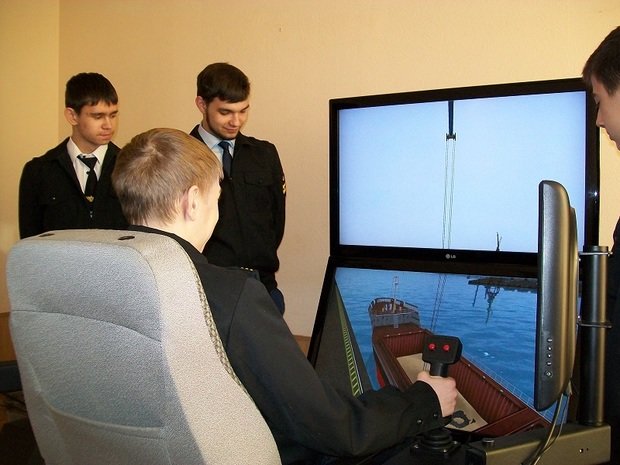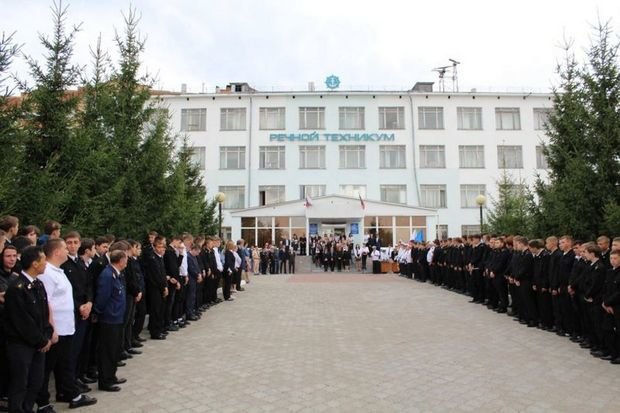''River engineering has been in oblivion for long and it’s beginning to revive only now''
River College 2.0: Kazan river college students will have a building, and people from Tunisia will come to study
Kazan River College, which merged with Volga State Water Transport University several years ago and became its branch in Kazan, is enjoying a new lease of life. The building has had its building reconstruction and residence hall's construction approved – the works planned to begin in 2019. In an interview with Realnoe Vremya, Director of the college Ilyas Salakhov told about his plans for admission of foreign applicants and prospects of the sector.
''We have 100% employment, as the naval industry lacks specialists''
Mr Salakhov, the university has appeared recently but it has a rich history…
The Kazan branch of Volga State Water Transport University was founded in 2006. But it comes from Kazan River College, which appeared as early as 1904 and was consequently named after Hero of Russia M. Devyatayev. Perhaps, our university isn't so widely known but it has a rich history.
Now can one get both higher and secondary education at VSWTU?
Yes, we train in four specialities in secondary vocational education and four specialities in higher professional education. Secondary education includes the use of ship machinery and automation equipment, the use of ship power plants, ship navigation, shipping arrangement. Higher education offers shipbuilding, we train personnel for our Zelenodolsk Shipbuilding Plant, ship navigation, use of ship power plants and ship electric equipment, automatic equipment and machinery.

We train in four specialities in secondary vocational education and four specialities in higher professional education
What about employment? What's the percentage of graduates who find a job with their degree?
We have 100% employment, as the naval industry lacks specialists. And now our area receives considerable support. According to a federal target programme, thanks to the Tatarstan president, the Ministry of Transport of Russia, the Naval and River Transport Agency, there was made a decision to build a new campus, it's being designed now.
Will it be built instead of River College or here in the university's building on 19 Portovaya Street?
The campus was built here, on Portovaya Street. The existing building is planned to have another floor, the hall of residence will be erected next to it. The hall of residence is vital because the previous one was recognised to be in an emergency state, and we haven't been using it since 2009. It's being designed now. I hope we will complete it till the end of the year and begin the construction in 2019. Many nuances need to be taken into consideration. The project's approval took much time. As you know, there is a large-scale investment programme aimed to improve this bank of the Volga River and the River Port's area.
''Everyone wants to become a diplomat, economic, jurist. But one thing is to enter and study, and the other is to find a job with this degree''
Who finances the works?
50% is financed by the federal treasury, 50% — by the regional one.
What will happen to the building of River College on Nesmelova Street? Will it be demolished?
A decision will be made. The building will be probably given to other owners. But it's early to talk about it.
Your establishment is the only place to train naval workers in Tatarstan. Is competition high?
There have been 2,3 people per state-financed place for secondary vocational education and 1,4 people for higher education. Of course, we'd like more, but it's how it is. Unfortunately, the sector isn't very popular among applicants. Everyone wants to become a diplomat, economic, jurist. But one thing is to enter and study, and the other is to find a job with this degree. Employment of our graduates is very good. And I think it's the most important thing.

The building will be probably given to other owners. But it's early to talk about it
How many people have you accepted this year?
110 people in secondary vocational education. We have small groups, 15 people because technical speciality training means almost individual approach. Enrolment on higher education continues until 25 November.
The HSE has recently published a rating of applicants' quality. So do universities that belong to the Ministry of Transport and the Ministry of Agriculture have the lowest average points? Do you agree with the conclusions?
Unfortunately, it's what we have. If every parent sees his or her child is good at studying, he or she wants the child to enter a prestigious educational establishment. Our average points have been 183 in United State Exams this year. It's not a low average point, neither is it big. I think the quality of applicants of some universities depends not only an educational establishment, not the politics. Unfortunately, both agriculture and river engineering have been in oblivion for long, and they are beginning to revive only now.
''We hope river engineering will get a great push in the nearest future''
What prospects does the sector have now?
Our Volga, Kama Rivers are big rivers. There is extracting industry, there are possibilities to develop tourism. We pin big hopes not only on the state but also investors. The state only sets areas, while investors need to invest. We have many ship companies. Apart from Tatflot, there are small companies. Our graduates work everywhere as captains. There are companies in Saint Petersburg, Moscow. It includes not only ships, but it's also ports, decks, factories. The Gorky Factory has many defence orders now. So there is no problem with it.
The profession is specific – one must love water, sea
Could you tell about your students? It's probably romantics and likely come from a dynasty of river workers where love for water is inherited.
50% of our students are really river workers by birth. The profession is specific – one must love water, sea. Although we can't provide with a hall of residence, we have many non-resident students – from Mari El, Udmurtia, Bashkiria, Kirov Oblast, Nizhny Novgorod, though the head university is there. There are foreign students – from Azerbaijan, Turkmenistan. Next year we plan to accept applicants from Tunisia and Arab republics. Now we're thinking of it because we need staff that could teach and know the specific terminology in both Russian, English and Arabic.
What is the salary your graduates can count on?
It's 25,000 rubles for a beginner, it's not bad for a beginner. The salary can be both 40,000 and 50,000, depending on the employer. Navy is the most promising area, of course, many people want to start working there. People return to the river when they approach the retirement age. In general, our graduates become mechanical technicians and mechanical engineers and, in fact, can work everywhere.